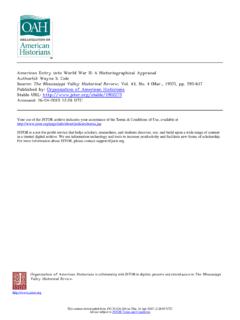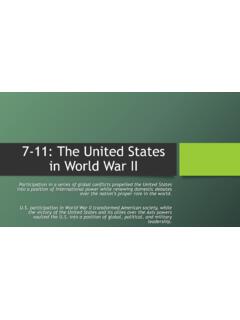Transcription of Sidney Bradshaw Fay ORIGINS OF THE WORLD WAR From …
1 Sidney Bradshaw FayORIGINS OF THE WORLD WARFrom Sidney Bradshaw Fay. ORIGINS of the WORLD War, Second Edition (II. pp. 547-558). Copyright 1930by Macmillan Publishing Co., and 1958 by Sidney Bradhaw Fay. Reprinted with permission ofMacmillan Publishing Co. the revisionist battle was raging on all fronts, from the daily press to scholarly conferences andjournals, and new revelations were ever bursting into print to furnish fresh ammunition for both sides,Professor Fay set to work quietly and systematically to rewrite the diplomatic backgrounds of the war andto unravel the tangled story of the 1914 crisis. His ORIGINS of the WORLD War, which appeared in 1928, wasthe first major work by an American historian to attempt a sober analysis of the whole problem, andimmediately put him in the front ranks of the moderate revisionists who were now more concerned withcritical judgment than with polemical acumen.
2 His conclusions, reprinted below, have stood the test of timeremarkably well, despite the additional sources and the changes in emphasis that have occurred since of the Powers wanted a European War. Their governing rulers and ministers, with very fewexceptions, all foresaw that it must be a frightful struggle, in which the political results were not absolutelycertain, but in which the loss of life, suffering, and economic consequences were bound to be terrible. Thisis true, in a greater or less degree, of Pasic, Berchtold, Bethmann Hollweg, Sazonoff, Poincar , San Giulianoand Sir Edward Grey. Yet none of them, not even Sir Edward Grey, could have foreseen that the politicalresults were to be so stupendous, and the other consequences so terrible, as was actually the many of the Powers, to be sure, a European War might seem to hold out the possibility of achievingvarious desired advantages: for Serbia, the achievement of national unity for all Serbs; for Austria, therevival of her waning prestige as a Great Power, and the checking of nationalistic tendencies whichthreatened her very existence; for Russia, the accomplishment of her historic mission of controllingConstantinople and the Straits.
3 For Germany, new economic advantages and the restoration of the Europeanbalance which had changed with the weakening of the Triple Alliance and the tightening of the TripleEntente; for France, the recovery of Alsace-Lorraine and the ending of the German menace; and forEngland, the destruction of the German naval danger and of Prussian militarism. All these advantages, andmany others, were feverishly striven and intrigued for, on all sides, the moment the war actually broke out,but this is no good proof that any of the statesmen mentioned deliberately aimed to bring about a war tosecure these advantages. One cannot judge the motives which actuated men before the war, by what they didin an absolutely new situation which arose as soon as they were overtaken by a conflagration they hadsought to avert.
4 And in fact, in the case of the two Powers between whom the immediate conflict arose, thepostponement or avoidance of a European War would have facilitated the accomplishment of the ultimateadvantages aimed at: Pasic knew that there was a better chance for Serbian national unity after he hadconsolidated Serbian gains in the Balkan Wars, and after Russia had completed her military and navalarmaments as planned for 1917; and Berchtold knew that he had a better chance of crushing the GreaterSerbia danger and strengthening Austria, if he could avoid Russian intervention and a general , a European War broke out. Why? Because in each country political and military leaders didcertain things which led to mobilizations and declarations of war, or failed to do certain things which mighthave prevented them.
5 In this sense, all the European countries, in a greater or less degree, were must abandon the dictum of the Versailles Treaty that Germany and her allies were solely was a dictum exacted by victors from vanquished, under the influence of the blindness, ignorance, hatred,and the propagandist misconceptions to which war had given rise. It was based on evidence which wasincomplete and not always sound. It is generally recognized by the best historical scholars in all countries tobe no longer tenable or defensible. They are agreed that the responsibility for the war is a dividedresponsibility. But they still disagree very much as to the relative part of this responsibility that fails on eachcountry and on each individual political or military writers like to fix positively in some precise mathematical fashion the exact responsibility for the was done in one way by the framers of Article 231 of the Treaty of Versailles.
6 It has been done in otherways by those who would fix the responsibility in some relative fashion, as, for instance, Austria first, thenRussia, France and Germany and England. But the present writer deprecates such efforts to assess by aprecise formula a very complicated question, which is after all more a matter of delicate shading than ofdefinite white and black. Oversimplification, as Napoleon once said in framing his Code, is the enemy ofprecision. Moreover, even supposing that a general consensus of opinion might be reached as to the relativeresponsibility of any individual country or man for immediate causes connected with the July crisis of 1914,it is by no means necessarily true that the same relative responsibility would hold for the underlying causes,which for years had been tending toward the creation of a dangerous may, however, sum up very briefly the most salient facts in regard to each felt a natural and justifiable impulse to do what so many other countries had done in the nineteenthcentury - to bring under one national Government all the discontented Serb people.
7 She had liberated thoseunder Turkish rule; the next step was to liberate those under Hapsburg rule. She looked to Russia forassistance, and had been encouraged to expect that she would receive it. After the assassination, Mr. Pasictook no steps to discover and bring to justice Serbians in Belgrade who had been implicated in the plot. Oneof them, Ciganovitch, was even assisted to disappear. Mr. Pasic waited to see what evidence the Austrianauthorities could find. When Austria demanded cooperation of Austrian officials in discovering, though notin trying, implicated Serbians, the Serbian Government made a very conciliatory but negative reply. Theyexpected that the reply would not be regarded as satisfactory, and, even before it was given, ordered themobilization of the Serbian army.
8 Serbia did not want war, but believed it would he forced upon her. ThatMr. Pasic was aware of the plot three weeks before it was executed, failed to take effective steps to preventthe assassins from crossing over from Serbia to Bosnia, and then failed to give Austria any warning orinformation which might have averted the fatal crime, were facts unknown to Austria in July, 1914; theycannot therefore be regarded as in any way justifying Austria's conduct; but they are part of Serbia'sresponsibility, and a very serious was more responsible for the immediate origin of the war than any other Power. Yet from her ownpoint of view she was acting in self-defence - not against an immediate military attack, but against thecorroding Greater Serbia and Jugoslav agitation which her leaders believed threatened her very State can be expected to sit with folded arms and await dismemberment at the hands of its was believed to be intriguing with Serbia and Rumania against the Dual Monarchy.
9 The assassinationof the heir to the throne, as a result of a plot prepared in Belgrade, demanded severe retribution; otherwiseAustria would be regarded as incapable of action, "wormeaten" as the Serbian Press expressed it, would sinkin prestige, and hasten her own downfall. To avert this, Berchtold determined to crush Serbia with war. Hedeliberately framed the ultimatum with the expectation and hope that it would be rejected. He hurriedlydeclared war against Serbia in order to forestall all efforts at mediation. He refused even to answer his ownally's urgent requests to come to an understanding with Russia, on the basis of a military occupation ofBelgrade as a pledge that Serbia would carry out the promises in her reply to the ultimatum. Berchtotdgambled on a "local" war with Serbia only, believing that he could rattle the German sword; but rather thanabandon his war with Serbia, he was ready to drag the rest of Europe into is very questionable whether Berchtold's obstinate determination to diminish Serbia and destroy her as aBalkan factor was, after all, the right method, even if he had succeeded in keeping the war "localized" and intemporarily strengthening the Dual Monarchy.
10 Supposing that Russia in 1914, because of militaryunpreparedness or lack of support had been ready to tolerate the execution of Berchtold's designs, It Is quitecertain that she would have aimed within the next two or-three years at wiping out this second humiliation,which was so much more damaging to her prestige than that of 1908-1909. In two or three years, when hergreat program of military reform was finally completed, Russia would certainly have found a pretext toreverse the balance in the Balkans in her own favour again. A further consequence of Berchtold's policy,even if successful, would have been the still closer consolidation of the Triple Entente, with the possibleaddition of Italy. And, finally, a partially dismembered Serbia would have become a still greater source ofunrest and danger to the peace of Europe than heretofore.








